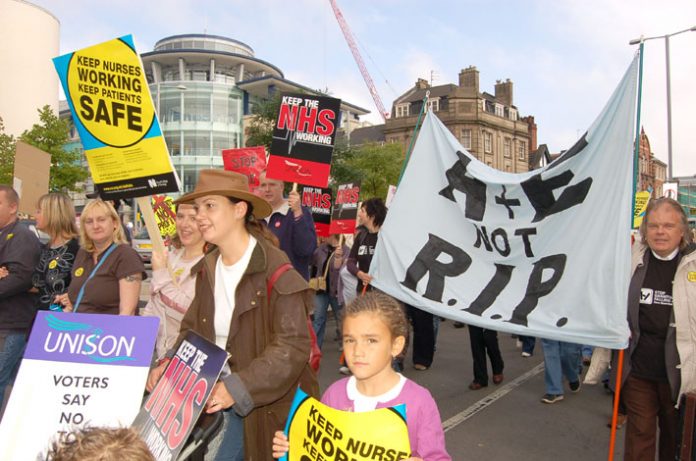
The GMB trade union yesterday condemned as ‘dubious’ a leaked NHS report recommendation that patients with life-threatening complaints be kept out of hospital and treated at home.
The draft report by the NHS Institute for Innovation and Improvement suggests that some patients with life-threatening conditions should be cared for at home by GPs and visiting nurses instead of being admitted to hospital.
The NHS Institute for Innovation and Improvement draft report says: ‘Emergency admission to an acute hospital bed should only take place in the context of an acute illness which requires inpatient care.
‘Many patients could be dealt with as a day case or redirected to the care of the GP.
‘These include 30-60 per cent of people who come to A&E with an ectopic pregnancy or complaining of chest pain and 60-90 per cent of those with gastroenteritis, a seizure, a head injury or those who need end of life care.’
It adds that those who are sent home should be given ‘clear and easy to read information’ and a specific place or person to contact if there is any concern.
GMB national officer Sharon Holder told News Line yesterday: ‘This report has come out conveniently with the current demand from the government of moving resources out of the hospital sector and into the community.’
She added: ‘The report is dubious, coming at a time when they are planning to close A&Es.
‘The trade unions will be taking action with members of the community when the need arises to defend A&Es.’
Holder also slammed ‘Blair’s think tank’ the IPPR’s claim that building ‘regional centres of excellence’ and closing district general hospitals’ A&Es will save up to 1,000 lives.
The GMB official said: ‘I don’t think the evidence is there to back the IPPR suggestion that keeping A&Es open will cost lives.
‘Local people and NHS staff at the front line who want to keep A&Es open have more experience in this area than IPPR researchers.
‘I’m appalled that the IPPR attacked these local campaigns.’
Dr Chaand Nagpaul, chairman of the BMA commissioning and service development subcommittee, said: ‘Many doctors would support the principle of caring for more patients outside hospital, but numerous questions need to be answered.’
Consultant surgeon Anna Athow warned: ‘This report is no doubt anticipating the effect of closing not just 60-100 A&E departments, but the acute medical and surgical wards into which emergency patients would normally be admitted and treated by consultant-led teams.
‘The report fleshes out plans to reconfigure 60 district general hospitals, after which patients will be left to manage their conditions on their own with some care guidelines and a district nurse or an emergency care practitioner popping in.
‘Far from being “innovative” and “improving”, this report gives a glimpse of the abyss to which Blair’s privatisation reforms are leading.
‘The unions have to organise in defence of our district general hospitals and link up with local campaigns to build councils of action to keep them open, with occupations and supporting industrial action as necessary.
‘The BMA should be leading this fight.’